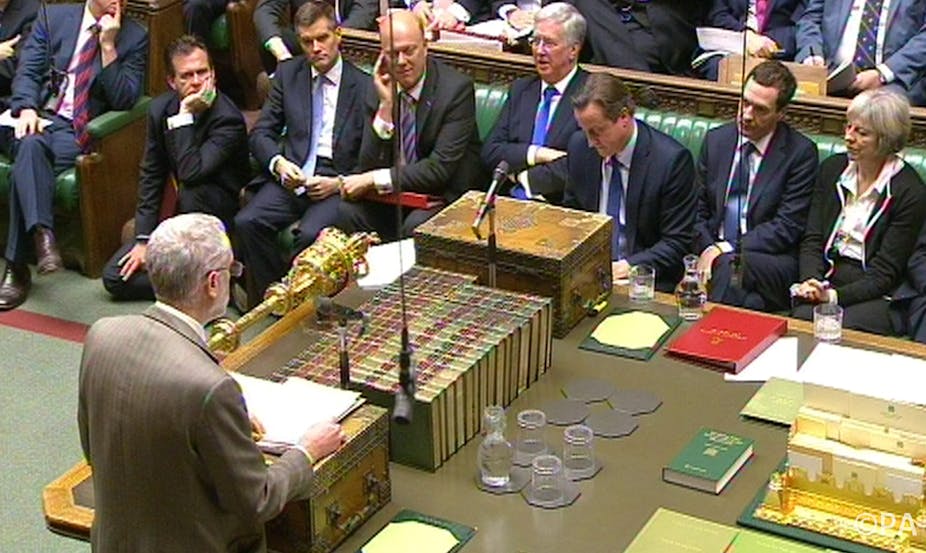After a barrage of bad press over his position on Trident and his flip-flop over the so-called “shoot-to-kill” policy for armed terrorists, you’d expect Jeremy Corbyn’s stock to be sinking fast, even among the most starry eyed of the “Jez-we-can” supporters who voted him in as leader of the Labour party in September. But a new YouGov poll reported in The Times has found that Corbyn enjoys the support of 66% of party members, a remarkable rise of seven points over the 59% who supported him at the leadership vote.
But his parliamentary colleagues aren’t as enthusiastic, to say the least, and his authority on the opposition benches will be sorely tested in coming days. First the party must respond to the government’s plans on defence spending and, within a matter of days, he and his team must also craft an effective response to the chancellor of the exchequer’s autumn statement.
To make matters even more tricky for Labour, the government will present new proposals to parliament on how to tackle the threat from Islamic State that may involve plans to extend the air campaign against the group from Iraq into Syria.
On all of these issues, the broadly pacifist instincts of Corbyn and his grassroots supporters are at odds with what his colleagues in the Parliamentary Labour Party feel is a more belligerent mood in the country. And the as the uneasy truce between the two sides begins visibly to break down, the Labour Party finds itself in a Mexican stand-off that could end very badly for all involved.
Treble trouble
Labour’s troubles are threefold. The first and most obvious source of conflict is ideological. Ever since World War I, when the the likes of the UK Labour Party, the Australian Labor Party and the German Social Democratic Party split over the slaughter in the trenches, left-of-centre parties have been divided between a principled pacifist wing and what has normally been a majority prepared to back military force when considered necessary.

As I have written here questions of defence, and in particular the future of the Trident nuclear deterrent, have the potential to split Labour. Corbyn’s recent remarks, in which he undermined Labour policy by stating that he would never sanction a nuclear strike, and more recently when he changed his mind over the so-called “shoot-to-kill” policy in the event of a potential Paris-style attack in the UK, have deeply angered many members of the parliamentary group.
The second problem is one of competence. Given that they have spent their careers on the backbenches, it is no surprise that left wingers like Corbyn and John McDonnell lack experience in managing the news cycle across a range of complex policy areas and ensuring that colleagues are all singing from the same hymn sheet.
It is a little more surprising to see colleagues such as Diane Abbott and Ken Livingstone, both of whom have more experience of running things, shooting from the hip as they have done in recent weeks. In the month since the controversial appointment of Seamus Milne as Corbyn’s head of communications things have, if anything, deteriorated further. In a private exchange, a Labour insider recently likened the party to a novelty advent calendar, in which every day the British public can open a new door to reveal a fresh calamity, an instance of surreal posturing, or just an example of rank incompetence.
The third problem, however, does not lie with Corbyn and his supporters but rather with some of his parliamentary opponents. For whether they like it or not, Corbyn is the democratically elected leader of the Labour Party and enjoys the support of the majority of the membership. If he were to be removed by parliamentary colleagues against the wishes of ordinary members there would be civil war.
Problem of discipline
No potential successor, such as Chuka Umunna or Dan Jarvis, would want to take over in such disarray. At the same time, no serious political party can tolerate the kind of sniping from the wings and briefings against the leader that we are currently seeing and still remain credible with the voters.
Paradoxically, Corbyn and his supporters appear to be unwilling to discipline the worst offenders (for example the MP Simon Danczuk) for fear of appearing to carry out a sectarian purge of the Labour right. At present all involved in Labour’s Mexican stand-off have a gun pointed directly at their own feet.
So where does Labour go from here? Corbyn’s leadership is not drinking in the last-chance saloon just yet, but a failure to perform convincingly in the defence debate could be deeply damaging. And, even if he does manage to cobble together a compromise on the broad parameters of Britain’s defence, the question of Trident remains unresolved and seemingly intractable.
In an effort to avoid conflict, Corbyn has put the Trident issue out to internal review – but the clock is ticking. The government plans to bring the issue to parliament before the end of the year and there is no sign that Labour will be able or willing to present a united front in one of the most important strategic debates of our time.

